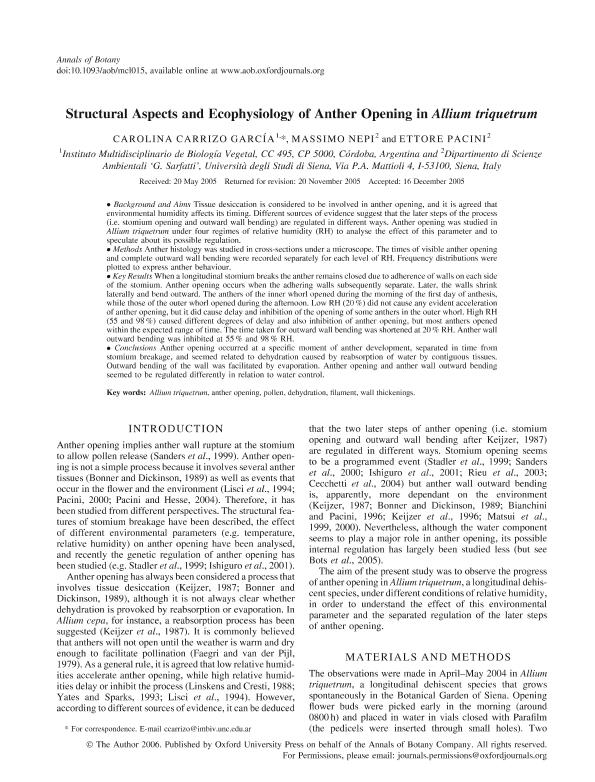Mostrar el registro sencillo del ítem
dc.contributor.author
Carrizo Garcia, Carolina

dc.contributor.author
Nepi; Massimo
dc.contributor.author
Pacini, Ettore
dc.date.available
2017-12-12T17:38:15Z
dc.date.issued
2006-12
dc.identifier.citation
Carrizo Garcia, Carolina; Nepi; Massimo; Pacini, Ettore; Structural aspects and ecophysiology of anther opening in Allium triquetrum; Oxford University Press; Annals of Botany; 97; 4; 12-2006; 521-527
dc.identifier.issn
0305-7364
dc.identifier.uri
http://hdl.handle.net/11336/30306
dc.description.abstract
Background and Aims Tissue desiccation is considered to be involved in anther opening, and it is agreed that environmental humidity affects its timing. Different sources of evidence suggest that the later steps of the process (i.e. stomium opening and outward wall bending) are regulated in different ways. Anther opening was studied in Allium triquetrum under four regimes of relative humidity (RH) to analyse the effect of this parameter and to speculate about its possible regulation.
Methods Anther histology was studied in cross-sections under a microscope. The times of visible anther opening and complete outward wall bending were recorded separately for each level of RH. Frequency distributions were plotted to express anther behaviour. Key Results When a longitudinal stomium breaks the anther remains closed due to adherence of walls on each side of the stomium. Anther opening occurs when the adhering walls subsequently separate. Later, the walls shrink laterally and bend outward. The anthers of the inner whorl opened during the morning of the first day of anthesis, while those of the outer whorl opened during the afternoon. Low RH (20 %) did not cause any evident acceleration of anther opening, but it did cause delay and inhibition of the opening of some anthers in the outer whorl. High RH (55 and 98 %) caused different degrees of delay and also inhibition of anther opening, but most anthers opened within the expected range of time. The time taken for outward wall bending was shortened at 20 % RH. Anther wall
outward bending was inhibited at 55 % and 98 % RH. Conclusions Anther opening occurred at a specific moment of anther development, separated in time from
stomium breakage, and seemed related to dehydration caused by reabsorption of water by contiguous tissues. Outward bending of the wall was facilitated by evaporation. Anther opening and anther wall outward bending seemed to be regulated differently in relation to water control.
dc.format
application/pdf
dc.language.iso
eng
dc.publisher
Oxford University Press

dc.rights
info:eu-repo/semantics/openAccess
dc.rights.uri
https://creativecommons.org/licenses/by-nc-sa/2.5/ar/
dc.subject
Anther Opening
dc.subject
Dehydration
dc.subject
Filament
dc.subject
Wall Thickenings
dc.subject.classification
Otras Ciencias Biológicas

dc.subject.classification
Ciencias Biológicas

dc.subject.classification
CIENCIAS NATURALES Y EXACTAS

dc.title
Structural aspects and ecophysiology of anther opening in Allium triquetrum
dc.type
info:eu-repo/semantics/article
dc.type
info:ar-repo/semantics/artículo
dc.type
info:eu-repo/semantics/publishedVersion
dc.date.updated
2017-11-03T20:46:31Z
dc.identifier.eissn
1095-8290
dc.journal.volume
97
dc.journal.number
4
dc.journal.pagination
521-527
dc.journal.pais
Reino Unido

dc.journal.ciudad
Londres
dc.description.fil
Fil: Carrizo Garcia, Carolina. Consejo Nacional de Investigaciones Científicas y Técnicas. Centro Científico Tecnológico Conicet - Córdoba. Instituto Multidisciplinario de Biología Vegetal. Universidad Nacional de Córdoba. Facultad de Ciencias Exactas Físicas y Naturales. Instituto Multidisciplinario de Biología Vegetal; Argentina
dc.description.fil
Fil: Nepi; Massimo. Universita Degli Studi Di Siena; Italia
dc.description.fil
Fil: Pacini, Ettore. Universita Degli Studi Di Siena; Italia
dc.journal.title
Annals of Botany

dc.relation.alternativeid
info:eu-repo/semantics/altIdentifier/url/https://www.ncbi.nlm.nih.gov/pmc/articles/PMC2803651/
dc.relation.alternativeid
info:eu-repo/semantics/altIdentifier/doi/http://dx.doi.org/10.1093/aob/mcl015
Archivos asociados
